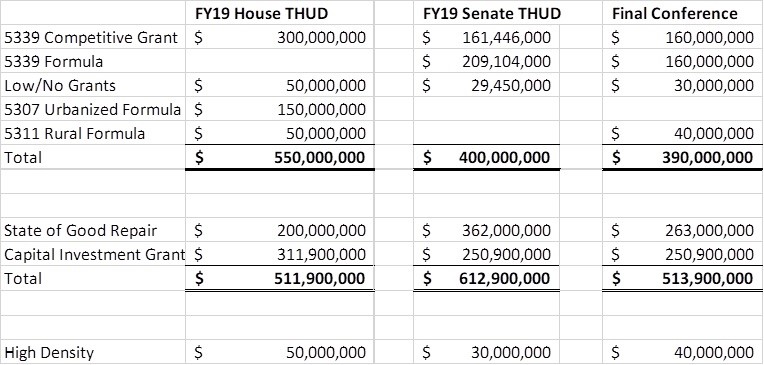Information provided by APTA and The Bus Coalition
The House Committee on Appropriations filed the Conference Report on H.J. Res. 31, the “Consolidated Appropriations Act, 2019”, which provides funding for the U.S. Department of Transportation (DOT) and other departments and government agencies for the remainder of fiscal year (FY) 2019. Funding for non-essential government activities (including much of DOT) is set to expire at 11:59 p.m. tonight (Feb. 15). On Feb. 14, the House and Senate approved the package, and the President is expected to sign the bill today.
The legislation provides more than $13.4 billion for public transportation and $2.6 billion for intercity passenger rail grants. Although these total funding levels are slightly less than the historic FY 2018 funding levels (-$67 million for public transportation and -$218 million for intercity passenger rail), they are significant increases over funding in past years and are:
- $2.0 billion more than the FY 2017 enacted funding levels;
- $1.2 billion more than the FY 2019 FAST Act authorization levels; and
- $3.5 billion more than the FY 2019 President’s Budget request.
The final bill provides $390 million for buses above FAST Act authorized levels.
The bill provides $2.6 billion for Capital Investment Grants (CIG) and requires the Federal Transit Administration (FTA) to obligate 85 percent of these funds by December 31, 2020. Of the $2.6 billion, the bill provides $1.2 billion for New Starts, $635 million for Core Capacity projects, and $527 million for Small Starts. The Better Utilizing Investments to Leverage Development (BUILD) program (formerly TIGER) provides grants for surface transportation projects, including public transportation and multi-modal projects. The bill provides $900 million for BUILD grants. One-half ($450 million) of this funding must be awarded for grants in large urbanized areas (population of 200,000 or more). Moreover, DOT is specifically directed to use the selection criteria from the 2017 NOFO and “not use the Federal share or an applicant’s ability to generate non-Federal revenue as a selection criteria in awarding projects.”
